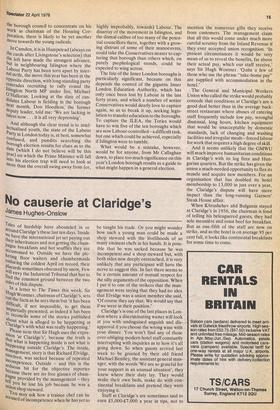No causerie at Claridge's
James Hughes-Onslow Tales of hardship have abounded in or around Claridge's these last ten days. Inside we have the international jet set paying out their inheritances and not getting the champagne breakfasts and hot souffles they are accustomed to. Outside we have the picketing floor waiters and chambermaids enduring the coldest April on record, their Placards sometimes obscured by snow, Few will envy the Industrial Tribunal that has to find the common ground between the two sides of this dispute. In a letter to The Times this week, Sir Hugh Wontner, chairman of Claridge's, sets out the facts as he sees them but 'it has been difficult, if not impossible, to get them IMPartially presented, as indeed it has been M reconcile some of the stories published about what is alleged to be happening at Claridge's with what was really happening.' Please note that Sir Hugh uses the expre,81.S6n 'at Claridge's', because the truth is hu'at what is happening inside is not what is aPPening outside Claridge's. The inside, Management, story is that Richard Elvidge, 11. ibeteen, was sacked because of repeated .111c°nIpetence. Outside — and this is the "brdnous bit for the objective reporter ,,eeause there are no free glasses of chamt't aigne provided by the management — they ,!11 You he lost his job because he was a "Ilion shop steward.
You may ask how a trainee chef can be accused of incompetence when he has yet to
be taught his trade. Or you might wonder how such a young man could be made a shop steward with the livelihoods of so many eminent chefs in his hands. It is possible that he was sacked because he was incompetent and a shop steward but, with both sides now deeply entrenched, it is very unlikely that any participant will have the nerve to suggest this. In fact there seems to be a certain amount of mutual respect for the silly arguments of the opposition. When I put it to one of the strikers that the management were saying that they had no idea that Elvidge was a union member she said, 'Of course they say that. We would say that if we were in their position.'
Claridge's is one of the last places in London where a discriminating waiter will look at you with undisguised anguish and disapproval if you choose the wrong wine with your dinner. You won't find any of those over-obliging modern hotel staff constantly interrupting with inquiries as to how it's all going down. So when guests arrived last week to be greeted by their old friend Michael Bentley, the assistant general man ager, with the words 'We are so grateful for your support in an unusual situation', they knew where their duty lay. They would make their own beds, make do with continental breakfasts and pretend they were enjoying it.
Staff at Claridge's are sometimes said to earn L5,000-£7,000 a year in tips, not to mention the numerous gifts they receive from customers. The management claim that all this would come under much more careful scrutiny from the Inland Revenue if they ever accepted union recognition. 'In present circumstances it would be very mean of us to reveal the benefits, far above their actual pay, which our staff receive,' says Sir Hugh Wontner. 'Quite a few of those who use the phrase "take-home pay" are supplied with accommodation in the hotel.'
The General and Municipal Workers Union who called the strike would probably concede that conditions at Claridge's are a good deal better than in the average backstreet restaurant where abuses of catering staff frequently include low pay, wrongful dismissal, long hours, kitchen equipment that would be unacceptable by domestic standards, lack of changing and washing facilities and irregular meals— forced labour for work that requires a high degree of skill.
And it seems unlikely that the GMWU will much improve humanitarian conditions in Claridge's with its log fires and Hungarian quartets. But the strike has given the union a much-needed opportunity to flex its muscle and acquire new members. For an organisation that has doubled its hotel membership to 13,000 in just over a year, the Claridge's dispute will have more impact than the long-running Garners' Steak House affair.
When Khrushchev and Bulganin stayed at Claridge's in 1956, the chairman is fond of telling his beleaguered guests, they had sole meuniere and roast beef for breakfast. But as one-fifth of the staff are now on strike, and as the hotel is on average 95 per cent full, it looks like continental breakfasts for some time to come.


































 Previous page
Previous page